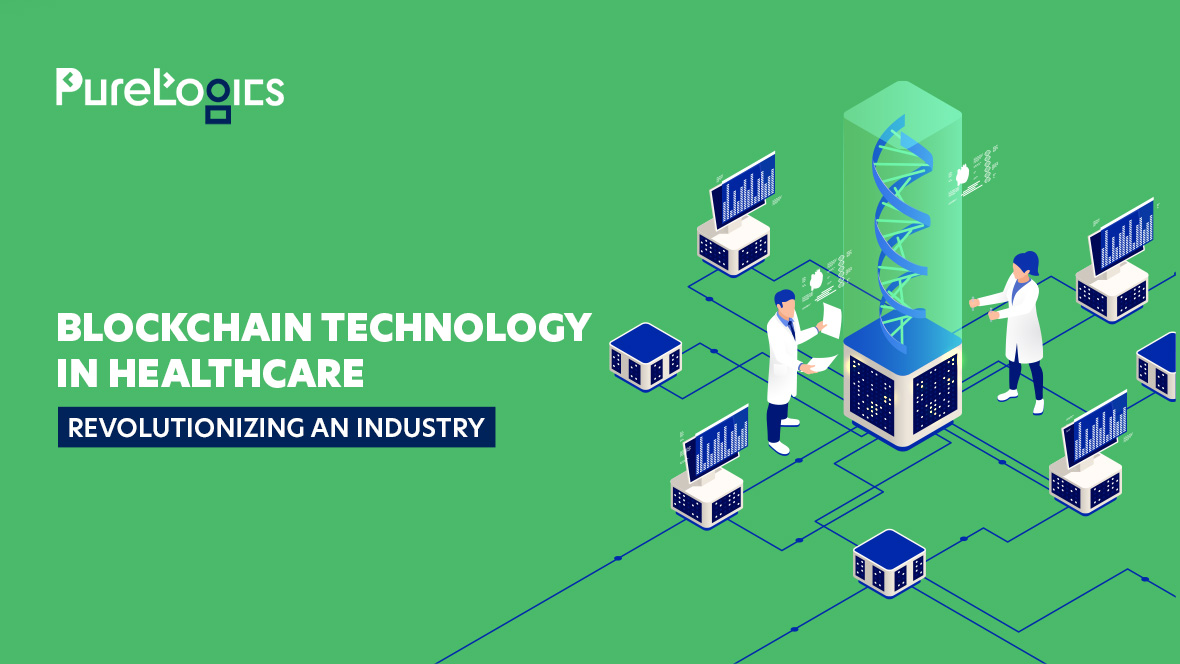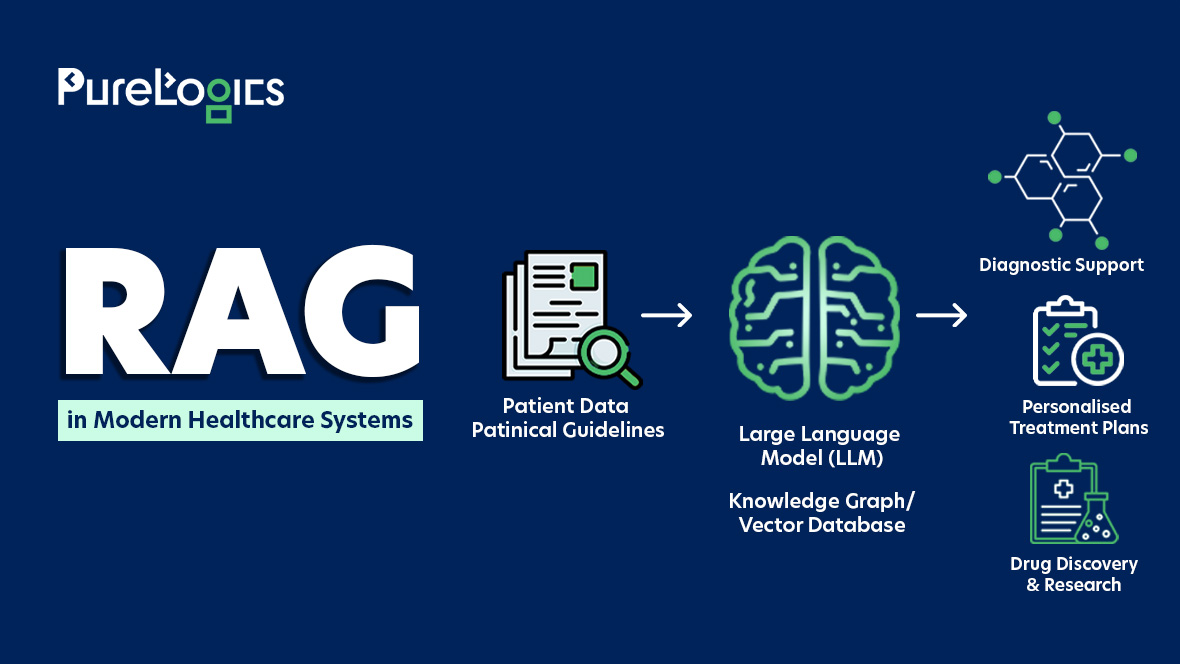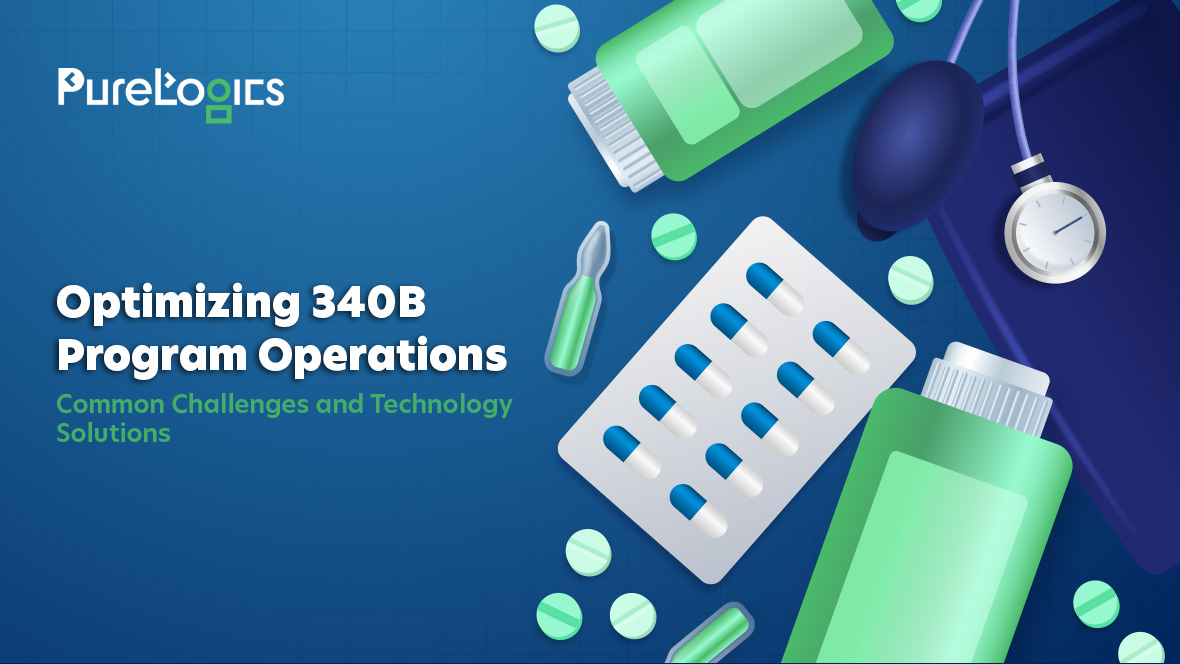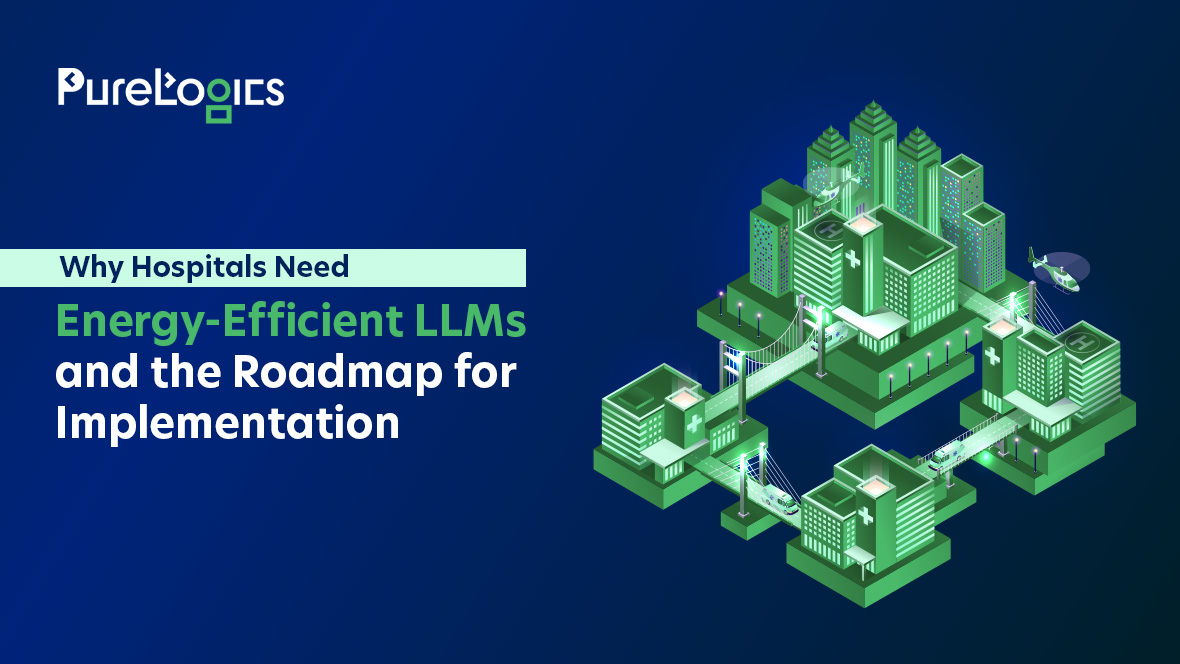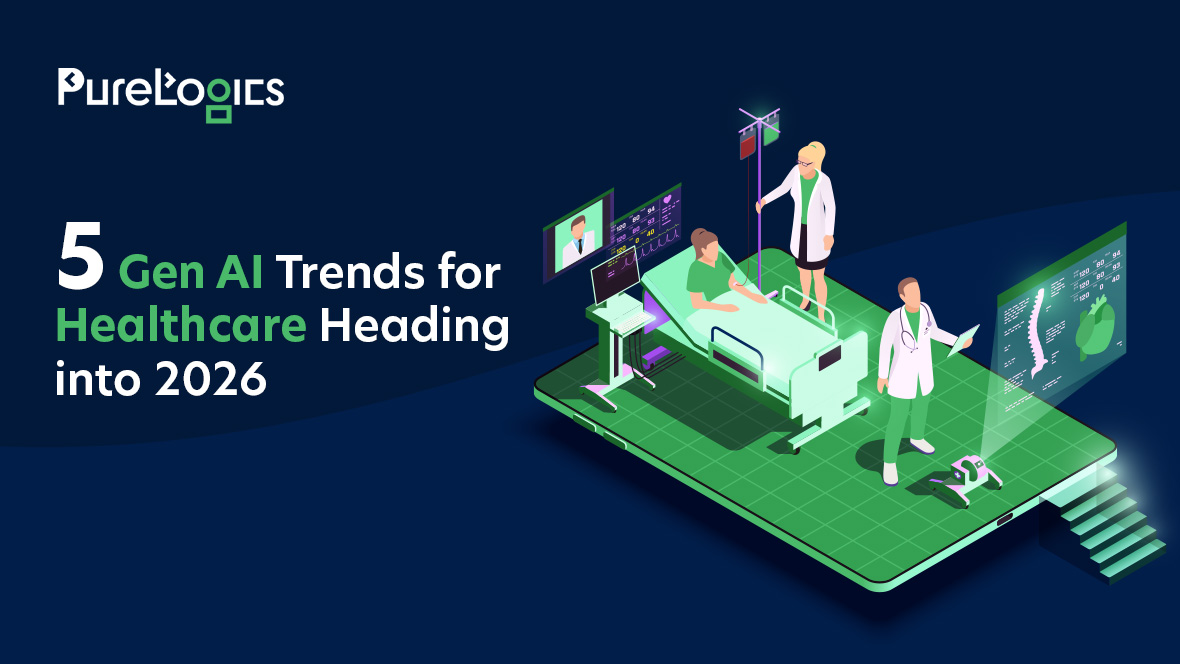The healthcare sector is under increasing pressure to strike a balance between managing costs effectively and delivering exceptional patient care. As the industry adapts to new and disruptive technologies, companies also face a significant challenge in ensuring data security amid fierce market competition.
Blockchain technology is emerging as a game-changer for healthcare, offering improved transparency, enhanced security, and greater efficiency in managing patient data and transactions.
With major players such as IBM, Microsoft, and Google investing heavily in blockchain research for healthcare, it’s evident that this technology holds immense potential.
Through blockchain-based solutions, these industry leaders are enabling the secure and transparent sharing of medical records, ensuring seamless interoperability among healthcare providers, and revolutionizing the management of pharmaceutical and medical device supply chains.
In this blog post, we will explore how blockchain is set to revolutionize healthcare. We will explore the various applications of blockchain in healthcare and discuss the challenges that must be addressed for the widespread adoption of this technology in the industry. Let’s dive in!
What is Blockchain in Healthcare?
The healthcare landscape is complex, involving numerous stakeholders, including doctors, hospitals, insurance companies, and government agencies. Blockchain technology has the potential to streamline communication between all these parties, making the exchange of vital patient information more efficient and secure.
For instance, blockchain can be leveraged to create a secure and decentralized platform for storing medical records securely and efficiently. This allows patients to have complete control over their health data while providing healthcare professionals with easy access to these records from anywhere. Furthermore, there have been numerous instances where sensitive medical data has been compromised through hacking or theft.
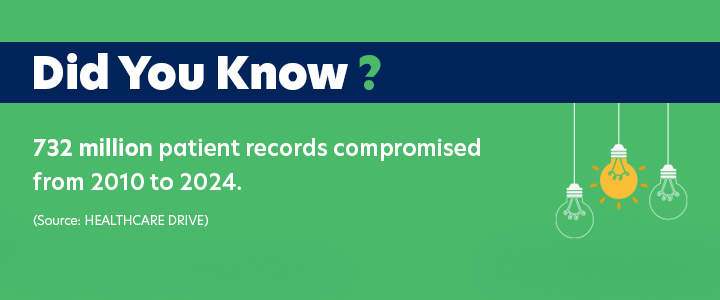
These staggering numbers highlight the urgent need for innovative solutions to address these issues. Blockchain technology plays a crucial role in mitigating data fraud risks, enhancing transparency, and fostering more efficient healthcare systems.
How is Blockchain Reshaping the Healthcare Industry?
Blockchain technology brings several advantages to the healthcare sector, including enhanced data security, improved monitoring, and greater efficiency. In this section, we’ll discuss the most significant benefits of blockchain and how it could potentially revolutionize the industry. Indeed, the role of blockchain in the healthcare industry is growing steadily.
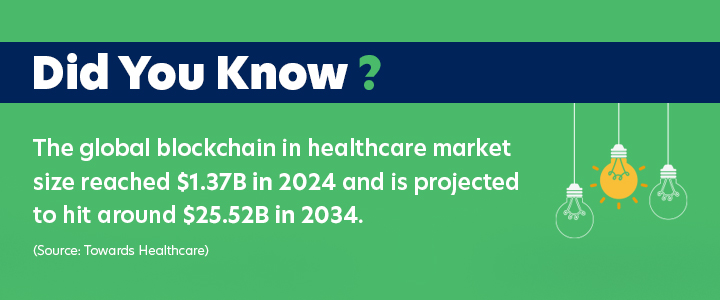
Let us tell you how blockchain is revolutionizing the healthcare industry.
Enhanced Data Security
In recent years, numerous incidents have occurred where sensitive medical data has been either hacked or stolen. For example, an IBM report revealed that in 2023, the global average cost of a data breach increased to $4.45 million, representing a 15% rise over the past three years.
Blockchain technology offers a promising solution to these data security challenges. As a distributed database, blockchain ensures secure, transparent, and tamper-resistant management of healthcare data. By storing patient data in a decentralized network instead of on a central server, blockchain makes it difficult for hackers to access or alter this vital information.
Furthermore, blockchain enables healthcare providers to share data securely while maintaining patient confidentiality. With encrypted data that is only accessible through authorized permissions, blockchain ensures that privacy is never compromised. It also helps combat fraud and corruption in healthcare by providing a clear audit trail of every transaction.
Take Cerner, for instance, a renowned healthcare organization that has partnered with a blockchain startup to improve data management and interoperability. Through initiatives like the Cerner Ignite Health Innovation Challenge, Cerner is developing solutions to address data exchange hurdles and enhance coordination among healthcare providers.
24/7 Data Monitoring
In the healthcare sector, continuous data monitoring is essential for managing and optimizing electronic health records. With lives on the line every day, even the most minor error can have catastrophic consequences.
From tracking a patient’s blood pressure to overseeing their prescriptions, every piece of data related to a patient’s health needs to be constantly monitored and assessed. However, the current healthcare infrastructure often falls short of providing this level of data availability, hindered by issues such as poor interoperability and frequent data breaches.
This is where blockchain shines. Its decentralized framework allows for continuous, 24/7 data availability, ensuring that electronic health records are always up-to-date and accessible. Additionally, blockchain addresses interoperability challenges by providing a standardized platform for data sharing among diverse healthcare providers. This enables healthcare professionals to easily access and exchange critical patient data, regardless of their location.
Enhanced Clinical Trials
The increasing number of clinical trials, the rising demand for outsourcing research and development (R&D), and the growing commercialization of drugs are key drivers behind this impressive market expansion.
However, the clinical trial process remains complex and time-consuming, involving numerous stakeholders. This often leads to inefficiencies and delays, which can hinder the overall success of trials. Furthermore, clinical trial data is typically siloed, making it challenging to share crucial information.
Blockchain technology has the potential to address these challenges by offering a secure and transparent method for storing and managing clinical trial data. By recording every step of the clinical trial process on the blockchain, data becomes easier to track, and errors can be identified efficiently. Moreover, blockchain could help verify the identities of both patients and doctors, ensuring that only authorized individuals have access to sensitive clinical trial information.
Enhanced Drug Safety
Adverse drug reactions (ADRs) remain a significant issue within the healthcare sector, causing thousands of hospitalizations and fatalities annually. Moreover, the financial burden of treating ADRs runs into billions of dollars each year.
Blockchain technology can help combat this issue by tracking the origins of drugs throughout the supply chain, enabling the early detection of counterfeit or adulterated medications. Additionally, blockchain can track patient outcomes, enabling healthcare providers to quickly identify any adverse reactions that may occur.
The potential for blockchain to improve drug safety is just one of many ways this technology could revolutionize the healthcare industry.
Smart Contracts
Smart contracts powered by blockchain have the potential to streamline several key processes within the healthcare industry. These self-executing contracts could automate tasks such as processing insurance claims, verifying eligibility for benefits, and scheduling appointments.
Beyond these functions, smart contracts can be used to securely manage patient data and medical records, ensuring that only authorized individuals have access to private health information.
Claims and Billing Management
Claims and billing management is a crucial aspect of healthcare, involving the filing and processing of medical claims related to a patient’s diagnosis, medications, and treatments. Unfortunately, there have been several instances where medical records have been compromised, resulting in cases of fraud and theft.
Blockchain can address these issues by providing a secure and transparent system for managing claims and billing, thereby reducing the risk of fraud and ensuring more accurate and efficient processing of medical claims. This technological innovation could significantly improve the overall trust and reliability of healthcare transactions.
Blockchain technology facilitates the elimination of issues such as fraud or unauthorized changes in medical data. The system operates by recording medical information and storing it in a transparent digital ledger, allowing any alterations made to the data to be visible to everyone involved in the blockchain network.
Beyond the previously mentioned advantages, blockchain in healthcare offers numerous other benefits, such as reducing medical errors, improving public health, and more.
Interoperability
Blockchain fundamentally transforms the way medical data is exchanged and utilized across various healthcare systems and providers. Traditionally, healthcare data has been siloed within individual institutions, leading to fragmented care and inefficiencies in the delivery of services.
However, blockchain enables data to be securely shared and accessed in a decentralized manner, allowing for seamless interoperability between different systems. This level of interoperability significantly enhances care coordination, enabling healthcare providers to access comprehensive patient records regardless of the system from which they originate. As a result, healthcare professionals can make more informed decisions, which ultimately leads to better patient outcomes.
Monetizing Health Data
Blockchain also presents businesses with a unique opportunity to monetize health data in innovative ways. By securely anonymizing and sharing patient data through blockchain-based platforms, companies can get valuable insights that can be used for research and development.
This ability to monetize health data not only encourages businesses to invest in medical research but also fosters innovation in healthcare. It paves the way for the discovery of new treatments, therapies, and personalized healthcare solutions, driving progress within the industry.
The Role of Blockchain in Data Privacy Compliance for Healthcare
The Health Insurance Portability and Accountability Act (HIPAA) is a U.S. law that enforces strict regulations on the use and sharing of patient data to protect privacy. Blockchain technology holds the potential to help healthcare organizations meet these requirements and stay compliant with HIPAA and other data privacy regulations. Let’s take a deeper look at how blockchain can play a crucial role in ensuring compliance in the healthcare industry.
- Blockchain provides a robust method for tracking the movement of pharmaceuticals and medical devices throughout the entire supply chain. Every action and transaction is recorded on the blockchain, creating an open and transparent audit trail that ensures accountability and transparency. This helps identify and prevent counterfeit drugs and devices from entering the healthcare system, ensuring that both patient safety is upheld and regulations against counterfeit goods are adhered to.
- Additionally, blockchain enables secure and standardized data exchange between healthcare institutions. This is a game-changer for care coordination, as it allows doctors and healthcare providers to access a patient’s comprehensive medical history across different systems. It also simplifies compliance with data-sharing regulations, ensuring the seamless and legal exchange of patient information.
- Blockchain technology enhances data integrity by storing patient records in encrypted blocks, making them tamper-proof and secure. Any alterations to the data would require updating the entire chain, which leaves behind a verifiable and transparent history. This feature ensures compliance with HIPAA, which mandates strict data security and audit trails.
- Blockchain empowers patients with control over their data. Patients can grant specific access permissions to healthcare providers, researchers, or any other authorized parties, thereby streamlining the consent process. This ensures compliance with regulations that require patient authorization before sharing data.
- Regulatory bodies can utilize blockchain to facilitate secure and automated reporting from healthcare institutions. This reduces the administrative burden on hospitals and clinics while ensuring that reporting requirements are met in a timely and accurate manner, further supporting compliance with regulatory standards.
All in all, the blockchain technology adds an extra layer of security by providing decentralised and transparent records of patient data.
Conclusion
The integration of blockchain into healthcare opens up unique opportunities to streamline operations, foster trustless collaboration, and ensure secure, tamper-proof data management.
If you’re ready to embrace change and adopt innovative solutions, PureLogics is here to help. As a trusted and reliable app development company, we specialize in providing custom blockchain development services designed to elevate your business.
Our team of experts is adept at harnessing the full potential of blockchain, delivering secure and innovative solutions that bring enhanced transparency and optimized processes to the forefront.
Partner with us to harness the power of blockchain in healthcare and gain solutions that enhance engagement and improve the overall user experience. Contact us today to elevate your healthcare business with blockchain-powered solutions.


 [tta_listen_btn]
[tta_listen_btn]
 June 19 2025
June 19 2025

